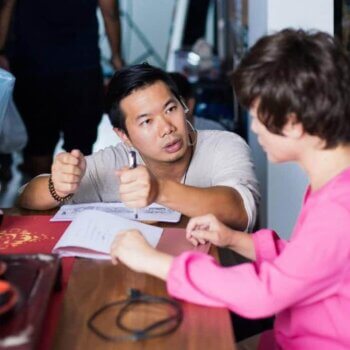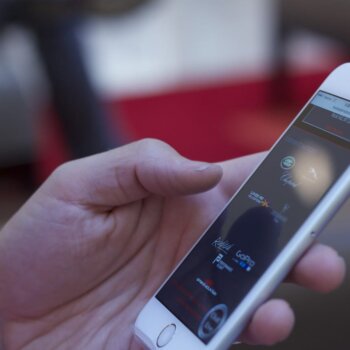In a Deloitte survey of Millennials, about 70 percent see themselves “working independently at some point, rather than being employed within a traditional organizational structure” Big Demands and High Expectations, The Deloitte Millennial Survey, January 2014). Many would call this the desire to be entrepreneurial… a desire to be unbound and pursue what will make a real difference.
Over the past year, I have been contributing to a blog called Thin Difference, which focuses on bringing generations together to guide and challenge Millennial leaders. We interviewed various Millennials to tap into their leadership insights and experiences. What emerges is an entrepreneurial mindset. Millennial Momentum is the series dedicated to what we uncovered.
In my experience, an entrepreneur is someone who is always improving how and what they do and how and what they think about. Change is at the center, tightly bundled in with thoughtful, energetic actions. This is a standard embraced by successful entrepreneurs and a standard many Millennials seem to be embracing.
I know there is more to being an entrepreneur than simply this, but there is a mindset of listening to understand and a fire within to develop a better way. No matter our generation or where we are, we need to be an entrepreneur of ourselves and our work.
Entrepreneurial Mindset of Millennials – Three Values
From our stories, three values seem to develop and arise in the entrepreneurial mindset of Millennials.
1. Always Improve
Always improving takes hard work. Hard work and tangible results produce trust and remove age barriers. Many Millennials are putting in the extra effort to read more, ask for more feedback, and adapt from what they learn. Starting with yourself opens windows of new possibilities of problems to solve and ventures to pursue.
“Looking for opportunities to improve, rather than falling in line is an entrepreneurial characteristic that can help anyone in any work environment.” – Madeline Caldwell, “Madeline Caldwell: Millennial Entrepreneur in Disguise?”
“If you want to be great you have to work to be great.” – Kern Carter, “Gifted Millennial Writer Kern Carter”
2. Always Engage
To take an idea from spark to success requires being great at removing barriers. Time well-spent is taking the time to understand the problem, finding the people who may have answers and experiences, and engaging smart people to refine the idea and move it from spark to success.
We want to champion ideas. However, when we gain the support of others, we engage the minds and hearts of other champions to gain momentum and achieve success. This is tough to do. We need to let go of our egos and tap into what others offer.
Whether a Millennial or not, this is a necessary challenge to overcome. Getting others engaged at an equivalent passion level as you makes or breaks many entrepreneurial cultures.
“My dad used to say, ‘There’s always someone out there smarter than you.’” – Sidney Kushner, “Sidney Kushner: A Millennial Leader Listening for Solutions”
“On this side I can look back and think, ‘I learned so much from that but man was it painful.’” – Hannah Becker, “Motivated Millennial Leader Hannah Becker”
3. Always Collaborate
Moving from engagement to collaboration takes skill and perseverance. Engagement may say “I’m in!” and collaboration says “I’m committed!” By being committed, new collaborative working relationships begin to happen. There is a give-and-take of ideas, building on what each has to offer and creating a better path forward together rather than alone.
Millennials understand the power of collaboration because they have been doing it through social channels, games, and crowdfunding a lot earlier in their lives than older generations did. This is a powerful capability and one that truly empowers an entrepreneurial mindset.
If you are looking for some solid collaborative advice, follow what the Common Sense Action team does:
Make space \ Take space: Each participant must be sure to make space for others’ opinions but also take opportunities to share opposing opinions and be heard.
Honest space \ Safe space: Each participant is encouraged to share honestly and to speak up if another participant shares an opinion that makes him or her feel uncomfortable or unsafe.
Trust intent \ Name impact: Each participant should be trusted to have the group’s best interest at heart but must also be made aware of the effect his or her statements have on other members of the group
“We got to discuss all different perspectives on an issue – not to try to win the debate but rather to learn something from each other.” – Andrew Kaplan, “Collaborative Millennial Leaders: Common Sense Action”
“If you’re open, willing to learn, willing to put yourself in the shoes of someone else it doesn’t matter what generation you’re from, you’re going to be able to work across those generational lines.” – Sean Graber, “Why Millennials Are Not Ready to Lead”
4. Wrapped in Purpose
Woven tightly within the entrepreneurial Millennial mindset is a persistent sense of purpose. The hunger is there. More than this, many are taking the added effort to understand their purpose and how they can enable it in the work they do and the initiatives they undertake.
Too often it takes older generations the latter part of their career to focus on purpose. Millennials are putting purpose front-and-center, which is where purpose belongs.
“Those of us fortunate enough to decide what we do should think deeply about what we care about, how we want to use the time we have, and how we can each leave this world a little better than we found it.” – Adam Smiley,“Daring Millennial Leader: Adam ‘Smiley’ Poswolsky”
What values do you want all generations to embrace in developing their entrepreneurial mindset?
written by Jon Mertz, Vice-President of Corepoint Health, Published Author and Writer of TexasEnterprise. see more.





























